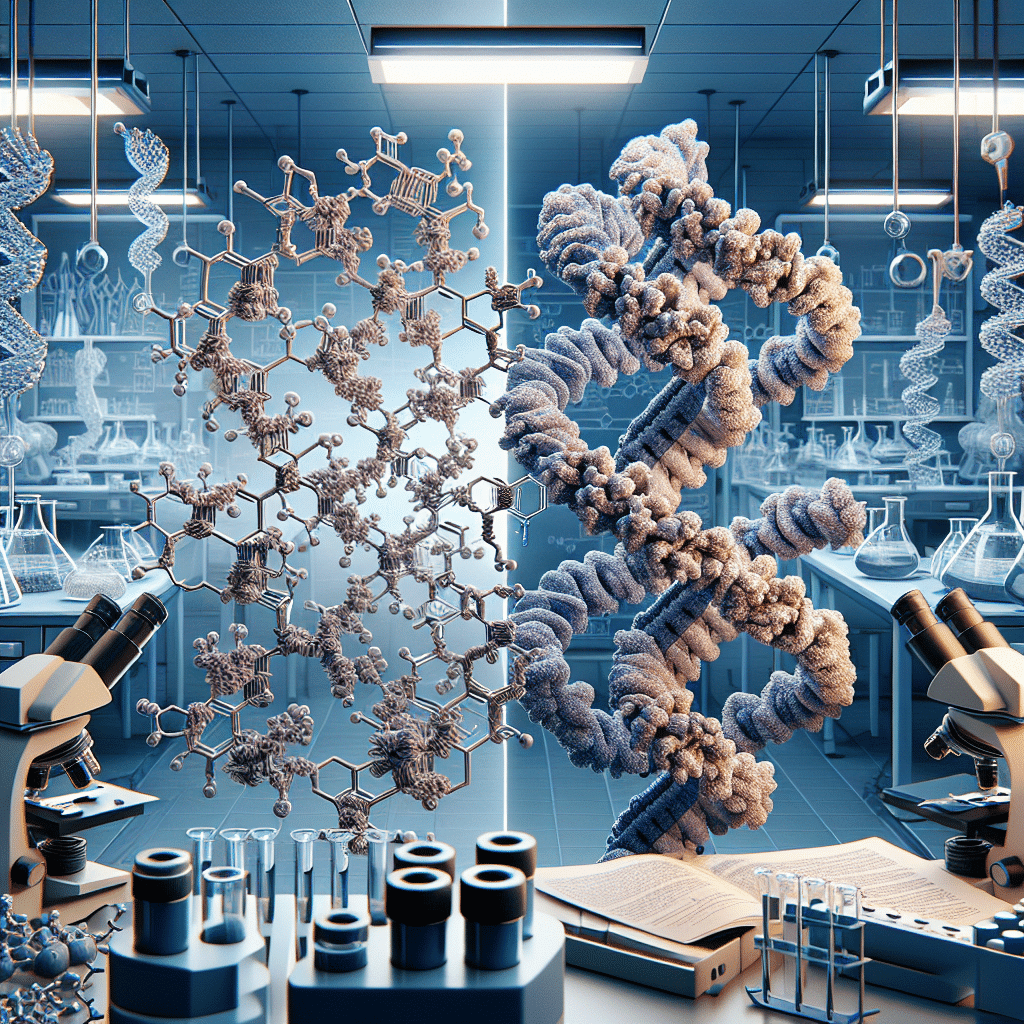Lab 34 Peptides and Proteins: Exploring the Basics
-
Table of Contents
- Peptides and Proteins: Unraveling the Fundamentals of Lab 34
- Understanding Peptides
- The Role of Proteins
- Lab 34: A Closer Look at Peptides and Proteins
- Case Studies and Applications
- Current Trends and Future Directions
- Conclusion: Key Takeaways from Lab 34’s Research
- Discover ETprotein’s High-Quality Protein Products
Peptides and Proteins: Unraveling the Fundamentals of Lab 34

Peptides and proteins are fundamental components of cells that carry out a vast array of functions necessary for the structure, function, and regulation of the body’s tissues and organs. Understanding these molecules is crucial for the advancement of various scientific fields, including biochemistry, molecular biology, and medicine. In this article, we will explore the basics of peptides and proteins, their structure, function, and the significance of laboratory research in this area, particularly focusing on the insights gained from Lab 34.
Understanding Peptides
Peptides are short chains of amino acids linked by peptide bonds and are considered the building blocks of proteins. They play a pivotal role in biological processes and can act as hormones, neurotransmitters, and as key components in the immune response. Peptides can be dipeptides, consisting of two amino acids, or polypeptides, which are longer chains.
- Structure of Peptides: The structure of peptides is determined by the sequence of amino acids and can be linear or cyclic. The peptide bond formation is a result of a dehydration synthesis reaction between the carboxyl group of one amino acid and the amino group of another.
- Function of Peptides: Peptides have diverse functions, including signaling molecules like insulin, which regulates blood sugar levels, and as antibiotics, such as polymyxin B, which disrupts bacterial cell membranes.
The Role of Proteins
Proteins are large, complex molecules that play many critical roles in the body. They are composed of one or more long chains of amino acids and are essential for the structure, function, and regulation of the body’s cells, tissues, and organs.
- Enzymatic Activity: Proteins such as digestive enzymes catalyze biochemical reactions, making them vital for metabolism.
- Structural Support: Collagen and elastin provide structural support in connective tissue, skin, and bones.
- Transport and Storage: Hemoglobin transports oxygen through the blood, while ferritin stores iron in the liver.
- Immune Response: Antibodies are proteins that bind to specific foreign particles, such as viruses and bacteria, to help protect the body.
- Regulatory Functions: Hormones like growth hormone regulate physiological processes.
Lab 34: A Closer Look at Peptides and Proteins
Lab 34 is a hypothetical or symbolic reference to a research facility dedicated to the study of peptides and proteins. In such a lab, scientists would conduct experiments to understand the structure and function of these molecules, and how they contribute to health and disease.
- Protein Synthesis: Researchers in Lab 34 might study the transcription and translation processes that lead to protein synthesis, exploring how the genetic code is translated into functional proteins.
- Protein Folding: The study of protein folding is crucial, as misfolded proteins can lead to diseases such as Alzheimer’s and Parkinson’s. Lab 34 could investigate the mechanisms that ensure proteins fold correctly.
- Protein-Protein Interactions: Understanding how proteins interact with each other is vital for comprehending cellular processes. Lab 34 might focus on mapping these interactions to understand complex biological systems.
Case Studies and Applications
Research in peptides and proteins has led to significant scientific breakthroughs and practical applications. For instance, the development of insulin therapy for diabetes was a direct result of peptide research. Similarly, understanding the structure of hemoglobin has helped in treating sickle cell anemia.
Lab 34 could contribute to such advancements by conducting research that leads to new drug development, therapeutic treatments, and diagnostic tools. For example, the discovery of a new signaling peptide could lead to the development of a drug that targets that specific pathway.
Current Trends and Future Directions
The field of peptide and protein research is rapidly evolving, with new technologies like CRISPR-Cas9 for gene editing and advancements in mass spectrometry for protein analysis. Lab 34 would likely be at the forefront of these technologies, applying them to uncover new insights into peptide and protein function.
Future research may focus on personalized medicine, where an individual’s unique protein expression patterns are used to tailor treatments. Additionally, the growing field of proteomics—the large-scale study of proteins—promises to revolutionize our understanding of cellular processes.
Conclusion: Key Takeaways from Lab 34’s Research
Lab 34’s research into peptides and proteins is essential for advancing our understanding of biology and medicine. The key takeaways include:
- The critical role of peptides as signaling molecules and their therapeutic potential.
- The diverse functions of proteins in the body and their importance in health and disease.
- The significance of studying protein synthesis, folding, and interactions to understand biological processes.
- The impact of current research on drug development, diagnostics, and personalized medicine.
As we continue to explore the intricate world of peptides and proteins, facilities like Lab 34 will remain instrumental in driving scientific discovery and innovation.
Discover ETprotein’s High-Quality Protein Products
If you’re looking for premium protein products, ETprotein offers a range of plant-based proteins that cater to various industries. Their commitment to quality, non-GMO, and allergen-free products makes them a top choice for businesses seeking reliable protein sources.
Whether you’re involved in nutraceuticals, pharmaceuticals, or the food and beverage industry, ETprotein’s extensive product line, including organic rice protein, pea protein, and seed-based proteins, provides the solutions you need. Their expertise in exporting and delivering tailor-made protein powders and nutritional supplements ensures that you receive the best products for your specific requirements.
Choose ETprotein for your protein needs and join the ranks of leading global brands that trust their exceptional service and products.
About ETprotein:
ETprotein, a reputable plant protein vegan protein Chinese factory manufacturer and supplier, is renowned for producing, stocking, exporting, and delivering the highest quality organic bulk vegan protein and plant proteins. They include Organic rice protein, clear rice protein, pea protein, clear pea protein, watermelon seed protein, pumpkin seed protein, sunflower seed protein, mung bean protein, peanut protein etc. Their offerings, characterized by a neutral taste, non-GMO, allergen-free attributes, cater to a diverse range of industries. They serve nutraceutical, pharmaceutical, cosmeceutical, veterinary, as well as food and beverage finished product distributors, traders, and manufacturers across Europe, USA, Canada, Australia, Thailand, Japan, Korea, Brazil, and Chile, among others.
ETprotein specialization includes exporting and delivering tailor-made protein powder and finished nutritional supplements. Their extensive product range covers sectors like Food and Beverage, Sports Nutrition, Weight Management, Dietary Supplements, Health and Wellness Products, and Infant Formula, ensuring comprehensive solutions to meet all your protein needs.
As a trusted company by leading global food and beverage brands and Fortune 500 companies, ETprotein reinforces China’s reputation in the global arena. For more information or to sample their products, please contact them and email sales(at)ETprotein.com today.












